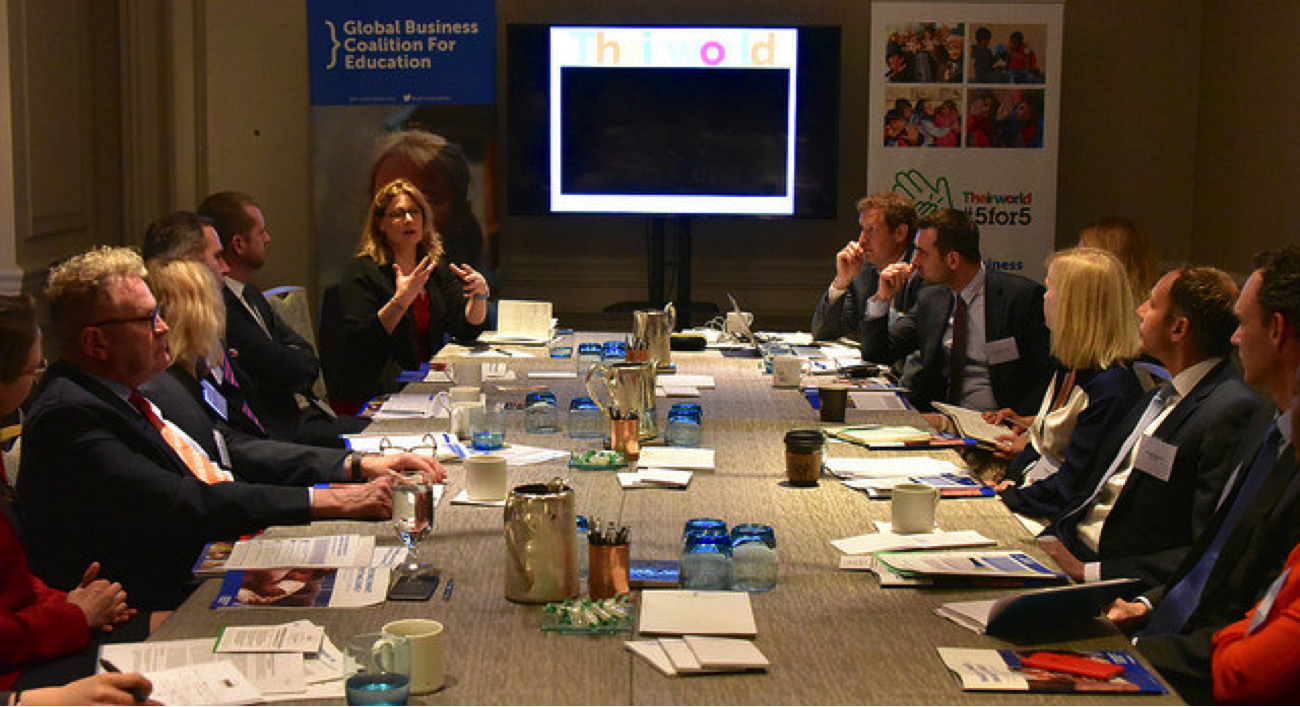Why Business Should Engage Early

Sarah Brown, Executive Director of GBC-Education, speaks to business and philanthropic leaders about early childhood development (ECD) during the IMF/World Bank Spring Meetings in Washington, DC. Photo by Lana Wong/Education Commission.
“The first five years of a child’s life – and the quality of care they receive during these years – have dramatic impacts for their physical and psychological health and school readiness, as well as their future place in the workforce.” – Sarah Brown, Executive Chair, Global Business Coalition for Education
Right after our annual breakfast, Sarah Brown was joined by GBC-Education members: Sumitomo, Luminos Fund, Oando Foundation, Dangote Foundation, Voith, HP, Discovery Learning Alliance, and Reed Smith, among other companies, to discuss the role the private sector can play in supporting ECD initiatives.
When it comes to investment opportunities, early childhood development offers one of the strongest rates of return for both businesses and communities. The benefits of investing in children are clear: when children ages 0-5 have access to quality and comprehensive ECD services (early learning and stimulation, nutrition, play, child and maternal health, and protection), they experience enhanced school readiness, improved academic achievement, increased income earning potential, and stronger employability. Less often do we hear about the tremendous benefits business stands to gain from these early investments—benefits that, as emphasized during the roundtable discussion, offer an equally compelling narrative.
When businesses invest in ECD-friendly corporate policies, they experience:
- Reduced absenteeism
- Improved productivity
- Improved retention, morale, and loyalty
- Overall enhanced competitiveness as an employer
In the long-term, ECD investments can help a company move beyond their relationship with employees, offering societal and equity benefits that result in strong returns on the initial investment. ECD-friendly policies and programs also help in the development of a skilled and healthier workforce, better outcomes for children, and improved social and economic equality.
Children who do not receive comprehensive early childhood education and development may find themselves stuck in an impoverished economic situation. This often leads to further strain on support systems ranging from governments to local communities.
Many executives in the room expressed a commitment to investing in early childhood development as a critical element of broader education goals. One of the key components of Sustainable Development Goal No. 4 (to ensure inclusive and quality education and promote lifelong learning) set forth by the United Nations in 2015 is to secure access to quality early childhood development for all of the world’s children.
Caitlin Baron from Luminos Fund explained that her company recognizes the necessity of adding an “ECD component to [Luminos Fund’s] work,” highlighting that ECD is essential towards developing the “education pipeline.”
This sentiment was echoed by Zouera Youssoufou of the Dangote Foundation, which operates in Nigeria where, as emphasized by Youssoufou, 10 million children are out of school and deep disparities exist between the southern and northern parts of the country. Amidst these challenges, the Dangote Foundation is a strong advocate for the early years, emphasizing the critical importance of not only investing early but also investing smart by integrating health and nutrition into education initiatives.
Working to address these same concerns, the Oando Foundation has prioritized the early years in their investments by expanding pre-primary education and care at adopted-schools across Nigeria. During the roundtable, Oando’s Esimaje O-Thompson acknowledged that “to build tomorrow’s history, we have to work with today’s present.”
GBC-Education members have also played important roles contributing to early childhood development through best-in-class corporate policies that are ECD- and family-friendly. Sumitomo, for example, has implemented award-winning policies and practices at their facilities across Japan. Such policies include providing employees with the opportunity to take their children with them while working overseas. Sumitomo has also established in-house daycare centers for its employees, lessening the burden of caring for children during work hours and also obviating the need to hire external care.
The roundtable concluded with Ben Hewitt from Theirworld speaking about the organization’s #5for5 campaign, which raises awareness of the need to invest further in ECD. As part of these efforts, Theirworld is putting pressure on the World Bank to support the establishment of an International Finance Facility for Education (IFFEd), which is necessary to bridge the gap in education financing and fund early learning programs. The campaign further advocates for expanding investments in ECD through the Global Financing Facility and through increased domestic funding of education.
To read more about investing early, please check out the Global Business Coalition for Education’s “Opportunities for Impact: The Business Case for Early Childhood Development” or check out our newly released brief on the business case for ECD, “Business Investment in Early Childhood Development: Policies and Programs.”
